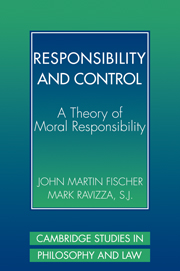Book contents
- Frontmatter
- Contents
- Acknowledgments
- 1 Moral Responsibility: The Concept and the Challenges
- 2 Moral Responsibility for Actions: Weak Reasons-Responsiveness
- 3 Moral Responsibility for Actions: Moderate Reasons-Responsiveness
- 4 Responsibility for Consequences
- 5 Responsibility for Omissions
- 6 The Direct Argument for Incompatibilism
- 7 Responsibility and History
- 8 Taking Responsibility
- 9 Conclusion
- Bibliography
- Index
8 - Taking Responsibility
Published online by Cambridge University Press: 05 June 2012
- Frontmatter
- Contents
- Acknowledgments
- 1 Moral Responsibility: The Concept and the Challenges
- 2 Moral Responsibility for Actions: Weak Reasons-Responsiveness
- 3 Moral Responsibility for Actions: Moderate Reasons-Responsiveness
- 4 Responsibility for Consequences
- 5 Responsibility for Omissions
- 6 The Direct Argument for Incompatibilism
- 7 Responsibility and History
- 8 Taking Responsibility
- 9 Conclusion
- Bibliography
- Index
Summary
INTRODUCTION
We have been seeking to present a comprehensive picture of moral responsibility, according to which responsibility is associated with control. On the approach we have been developing, the conditions for responsibility for actions, consequences, and omissions are unified by the notion of guidance control. When an agent is morally responsible for, say, an action, we have proposed that it must be the case that the action flows from the agent's own, moderately reasons-responsive mechanism. Thus far we have been primarily concerned with explaining moderate reasons-responsiveness and drawing out some of its implications.
In the previous chapter we argued that moral responsibility is an essentially historical notion: someone's being morally responsible requires that the past be a certain way. We motivated this point (in part) by reference to certain cases in which the histories behind the configuration of mental states seemed to rule out moral responsibility. In such a case, we claimed that the mechanism from which the agent acts is not, in an appropriate sense, the agent's own. Thus, in order to establish whether the mechanism from which an agent acts is his own, we must attend to aspects of the history of the action.
More specifically, we have suggested that the past must contain a process of “taking responsibility.” Taking responsibility, we believe, is a necessary feature of moral responsibility. It is part of the process by which a mechanism leading (say) to an action, becomes one's own.
- Type
- Chapter
- Information
- Responsibility and ControlA Theory of Moral Responsibility, pp. 207 - 239Publisher: Cambridge University PressPrint publication year: 1998

